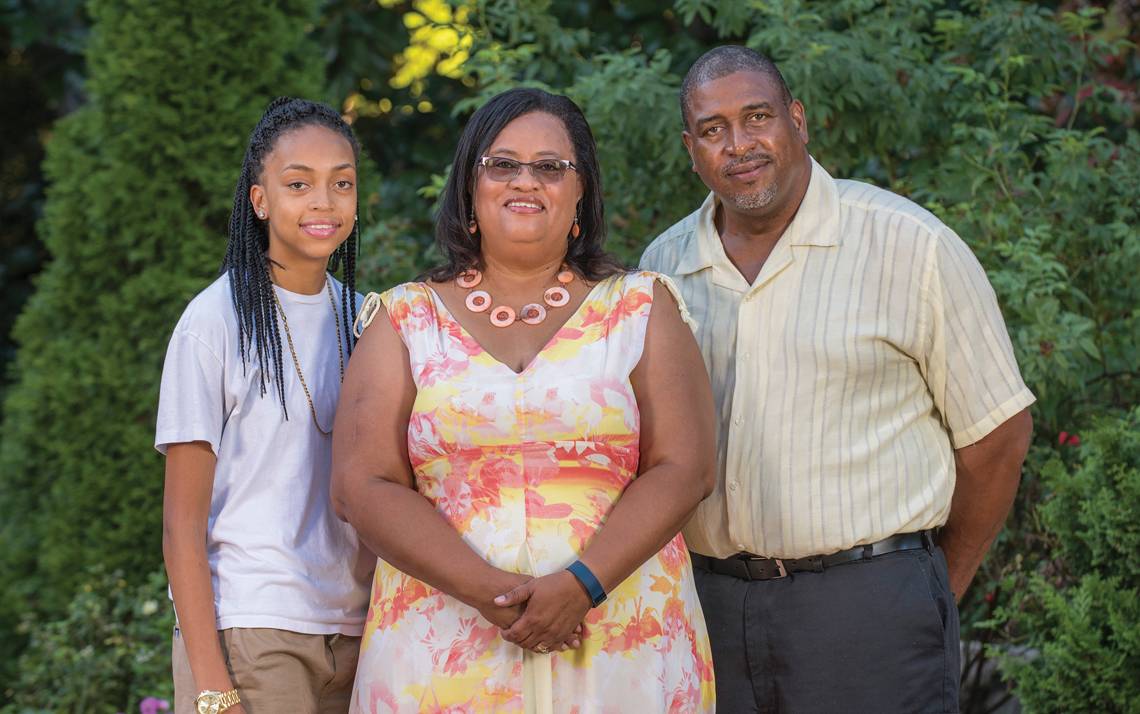An Outlet for Theresa
How Duke’s counseling service helped an employee after a cancer diagnosis

After her husband Johnny was diagnosed with stage four non-Hodgkin lymphoma, Theresa Johnson stayed with him every night after surgery on his spinal cord and during a three-month hospital stay while he received round after round of aggressive chemotherapy.
She slept in a recliner at a cancer center, taking breaks to visit the cafeteria for fruit cups or hamburgers. In the morning, Theresa went home to see the couple’s daughter, Tariah, off to middle school and later drove her to basketball practices or games. Theresa also managed Johnny’s landscaping and garbage pickup business, logging customer checks, paying employees, and filling trucks with gas.
After Johnny was discharged, Theresa made chicken pasta casseroles and gave him sponge baths. After a full year of caring for her husband of 20 years and their family, all Theresa wanted to do was sleep.
“Some of those feelings I had, my husband and my daughter don’t have a clue about, because I didn’t want them to see the broken-down side of me,” said Theresa, 52, a project manager with Duke Patient Revenue Management Organization Operations Improvement. “All they saw was this rock that kept everything going.”
Seeking help, Theresa made an appointment with Duke’s Personal Assistance Service (PAS), a short-term counseling service offered at no charge to University and Health System staff and faculty. She met with a counselor five times, from 2012 to 2013, to process her husband’s medical journey, fatigue from being a family “superhero,” and the stress of balancing family visits with her husband’s immunosuppressed health.
During the first session, the counselor asked Theresa what brought her to PAS and how the service could help. Before Theresa could answer, she began hyperventilating as pent-up emotions rose to the surface.
“I just needed someone to vent to who wasn’t going to take my venting somewhere else, that was not going to perceive it as I no longer cared for my husband or I didn’t want to take care of him,” Theresa said. “PAS was an outlet for me to say this is how I feel without having to think about Johnny, his family or Tariah.”
Many other Duke community members have found support in PAS. From July 2015 to July 2016, PAS held about 4,000 in-person sessions with Duke employees and immediate family members. Counselors help with a variety of concerns, including depression, anxiety and stress, relationship issues with a spouse, partner or family member, substance abuse, and work concerns.
Duke employees and family members are eligible for up to eight sessions per concern. Services are confidential. Counselors also offer consultations at no charge for supervisors, managers and departments at Duke.
“PAS has made the biggest impact by providing a consistent, safe, private, competent resource over the past 30 years to help Duke faculty and staff with a very broad range of life issues,” said Andy Silberman, PAS director. “Everybody has challenges in life that arise that require focus, time and energy.”
Theresa’s husband is now cancer free but takes medication for nerve damage in his feet caused by radiation and chemotherapy treatments. Still, he runs his landscaping and garbage pickup business in Chapel Hill.
At Duke, Theresa has met one-on-one with colleagues going through issues at work or home. She shares her experiences with PAS and tells them not to be afraid to seek help.
“Everybody needs somebody,” Theresa said. “If you want to be in a safe, neutral environment that’s not going to impact your family, that’s the best place to be, because PAS therapists are trained to provide you with the support that you need.”
Be Kind to Yourself

This is a model of wellness represented by an image of a tree, which includes the roots of a person, the trunk of self-care, and branches representing dimensions of wellness. All parts are interactive and interdependent. The graphic depicts the parts that are involved in keeping the tree (person) healthy. Each dimension of wellness is essential in maintaining harmony and balance in life. Illustration courtesy of the Duke Student Wellness Center.
Part of Mark Leary’s research at Duke focuses on understanding the differences between self-esteem and self-compassion.
Leary explains that self-esteem is the degree to which people evaluate themselves positively. Self-compassion is showing oneself kindness after making a mistake or experiencing a difficult life challenge, whether it is making a small error at work or going through divorce.
“Most of us have a tendency to beat ourselves up and be self-critical and be down on ourselves,” said Leary, a psychology and neuroscience professor and director of the Interdisciplinary Behavioral Research Center at Duke. “Most people are far meaner to themselves than they are with other people.”
Here are five ways to practice self-compassion:
1) You’re not alone in the face of a problem. “A big part of self-compassion is recognizing that whatever problems you have or whatever you might have done, this is not unique to you,” Leary said. “Whatever you’ve done has happened to millions of other people. … Sometimes we all goof up, but you don’t need to take it personally because we’re all human.”
2) Pinpoint the good things in life, said Julie Seel, a licensed psychologist with Duke Integrative Medicine. Take time daily to cultivate healthy relationships, view obstacles as ways to grow, and practice gratitude.
3) Don’t let anxiety fester. “When life gets harder, we tend to bear down and work particularly harder,” Leary said. “If you mess up at work, don’t sit and think about it all evening. … Life is tough. Be nice to yourself.”
4) Take time for yourself. “For some people that’s going out dancing, for others it’s sitting alone in a garden,” said Amy Powell, director of DukeReach in the Dean of Students Office. “Everybody has their own way of nourishing themselves and their spirit.”
5) Display helpful reminders in your work space. “That can become a reminder of a person’s self-worth and why they’re a good person,” Powell said.
Get Help
To make an appointment with Duke’s Personal Assistance Service, call (919) 416-1727. Visit pas.duke.edu for more information.